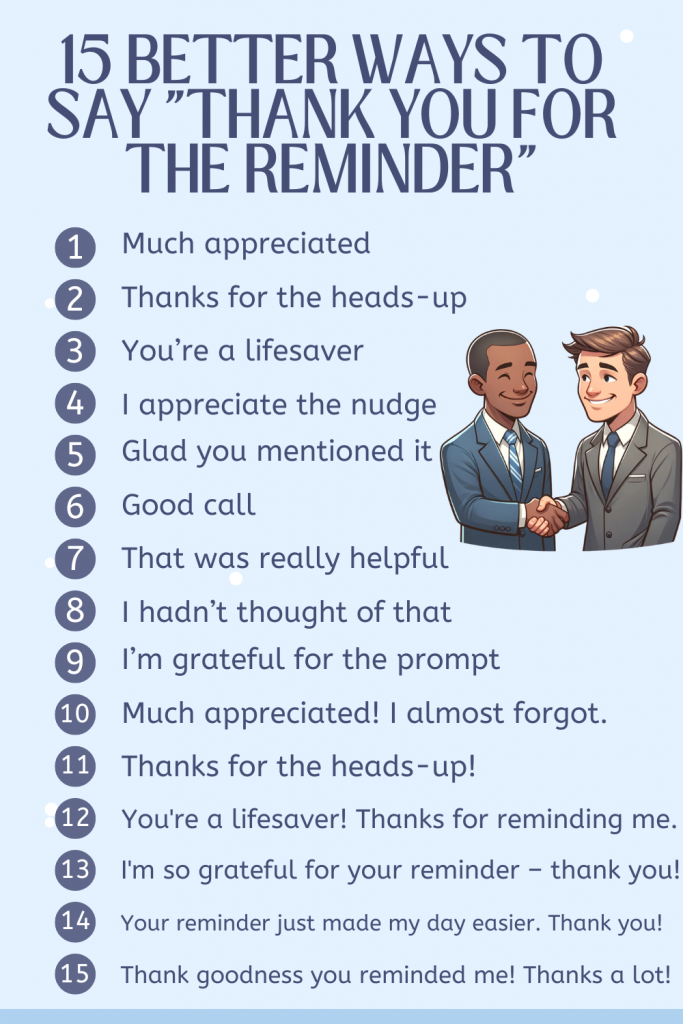These days, life moves fast and it’s just too easy to miss stuff or blank on things we have to handle. Reminders can be a total lifesaver, helping us stay on track. When someone gives you a nudge about something important, it feels good to say thanks. But ‘thank you for the reminder’ gets old quickly. In this post, I’ll toss out some ways to mix up how you show appreciation that add a personal touch.
Alternatives to “Thank You for the Reminder”
1. Much appreciated
Example: Your reminder about tomorrow’s meeting was much appreciated!
Usage: “Much appreciated” is a great go-to phrase when someone gives you a helpful heads-up or reminder. It’s nice and simple, but still shows you’re grateful they took the time. Whether it’s a work email or chatting with friends, it fits in most situations.
2. Thanks for the heads-up
Example: Thanks for the heads-up about the deadline change!
Usage: “Thanks for the heads-up” is kind of similar, but more casual and conversational. You can use it more with friends or family when the reminder helps you avoid a mistake or fixes an oversight on your part and it’s like saying I owe you one for saving me there!
3. You’re a lifesaver
Example: Thanks, you’re a lifesaver for reminding me about the parent-teacher meeting!
Usage: Use it when someone really saves your behind with a well-timed reminder. Best used in informal situations.
4. I appreciate the nudge
Example: I appreciate the nudge – almost forgot about the project submission!
Usage: “Appreciating the nudge” is more understated, but still respectful. It’s like saying I might have waited too long if you hadn’t encouraged me gently. It’s great for work projects or group assignments when someone pushes the team in the right direction. Conveys we’re all in it together!
5. Glad you mentioned it
Example: Glad you mentioned our appointment, I had it down for next week!
Usage: This is a super helpful friendly reminder to show gratitude, suitable for everyday conversations.
6. Good call
Example: Good call on reminding me about the early bird registration!
Usage: This phrase shows that you value the person’s timely reminder and consider it a wise or insightful observation. Best for informal settings.
7. That was really helpful
Example: Your reminder to bring the documents was really helpful, thanks!
Usage: Sometimes we get caught up in our own heads and miss things that should be obvious. So when someone else pipes in with a timely reminder, it can be hugely valuable whether we’re trying to avoid mistakes at work or simply have a nice chat with friends.
8. I hadn’t thought of that
Example: Thanks, I hadn’t thought of checking the expiration date!
Usage: This phrase says – It’s easy for us all to have blindspots so consider me open and welcoming to any timely reminders or gentle nudges back on track!
9. I’m grateful for the prompt
Example: I’m grateful for the prompt; it slipped my mind!
Usage: That’s a nice formal way to say thanks, adding a touch of personal appreciation to your response.
10. Much appreciated! I almost forgot.
Example: Much appreciated! I almost forgot about our meeting tomorrow. Your message was right on time.
Usage: It lets people know you’re thankful they stopped you from screwing up. We all space out sometimes right?
11. Thanks for the heads-up!
Example: Thanks for the heads-up about the road closure; I’ll take a different route to work today.
Usage: This expression has a fun, casual vibe to it. You can use it when talking with friends if they warn you about something before you stick your foot in your mouth.
12. You’re a lifesaver! Thanks for reminding me.
Example: You’re a lifesaver! Thanks for reminding me to bring my passport. I would have left it behind.
Usage: It’s like saying I owe you big time! without sounding too weird.
13. I’m so grateful for your reminder – thank you!
Example: I’m so grateful for your reminder to submit the report today – thank you! I had completely lost track of the deadline.
Usage: In other words, said – that little nudge kept me on track and prevented me from slipping up.
14. Your reminder just made my day easier. Thank you!
Example: Your reminder just made my day easier. Thank you! Now I won’t have to rush in the morning.
Usage: Use this when you want to say that someone’s reminder has had a practical and positive effect on your day, simplifying or streamlining your responsibilities.
15. Thank goodness you reminded me! Thanks a lot!
Example: Thank goodness you reminded me about the upcoming event! Thanks a lot!
Usage: This phrase is great for situations where you are relieved or grateful that the reminder helped you remember something important that potentially prevented a forgotten mistake.

When to Use Different Expressions of Gratitude
How you say thanks depends on the sitch and who hit you with the reminder some phrases work better for formal convos, and others for chilling with friends. Here’s a quick guide:
Casual Conversations
In informal interactions with friends and family, use expressions like “you’re a lifesaver” and “glad you mentioned it.” These phrases add a personal touch and warmth to your gratitude.
Formal Conversations
In a professional context, opt for phrases like “much appreciated” and “I appreciate the nudge.” They maintain a respectful tone while effectively conveying your gratitude.
Personal but Formal Interactions
For situations that are personal yet require a degree of formality, such as with a teacher or a doctor, phrases like “that was really helpful” and “good call” strike the right balance.
Conclusion
So in all kinds of situations, from formal to fun there’s a way to show your gratitude. Use one of the above great expressions and show that you can be polite and that you know the best words for the best situations. Just pick the phrase that fits the relationship and context best!
FAQs
1. How do these phrases compare to simply saying ‘Thanks’ or ‘Thank you’‘?
• While a simple ‘Thanks’ is universally acceptable, these alternative phrases add depth and specificity to your gratitude. They allow you to convey not just thankfulness but also the impact the reminder had on you, making your response more personal and heartfelt.
2. Are these alternatives better than a standard ‘Thank you for the reminder’?
• ‘Better’ is subjective and depends on the context. These alternatives offer variety and can be more impactful in certain situations. For instance, saying ‘You’re a lifesaver!’ can express more enthusiasm and appreciation compared to a standard ‘Thank you.’
3. In what situations would a traditional ‘Thank you’ be more appropriate than these alternatives?
• In very formal or brief interactions where the norm is to be concise and direct, a traditional ‘Thank you’ might be more fitting.









